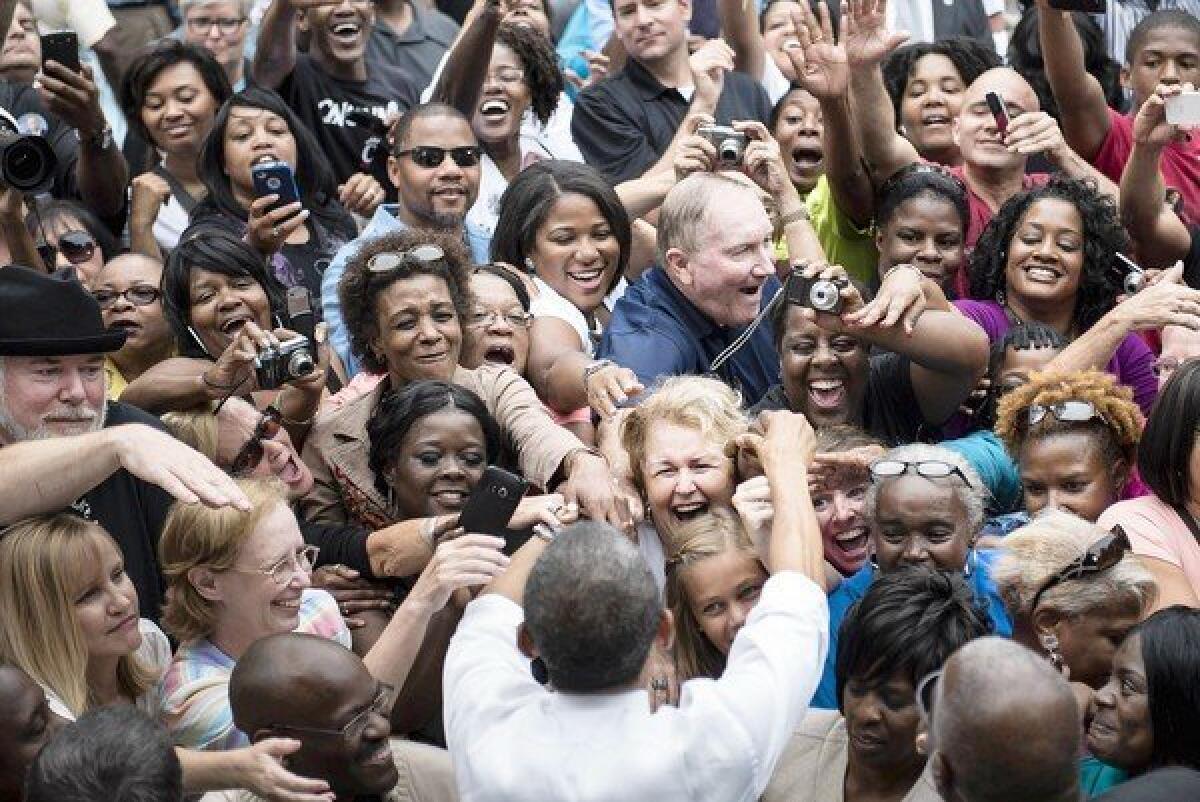Muslim anti-American violence complicates Obama campaign

- Share via
CINCINNATI — With violent anti-American protests stretching into a second week, President Obama’s reelection campaign is treading cautiously, mindful that the turmoil abroad may still have an unpredictable effect at home.
Administration officials have said they are braced for sustained unrest across the Islamic world, and campaign aides said they were trying to hit the right tone on the campaign trail.
Obama campaigned in Ohio on Monday, staging two boisterous rallies in the all-important swing state, as anti-American rioters clashed with police in Karachi, Pakistan, and Kabul, Afghanistan. Despite the eruptions, there were signs the protests, spurred in part by an anti-Muslim film, were waning.
PHOTOS: Protests over anti-Islam film spread
In his remarks, Obama made only a brief reference to the “events of the past week” as evidence of the persistent dangers around the world.
“We can’t just pull back,” Obama said. “We’ve got to stay engaged and involved for our security. But we’ve also got to remain vigilant.”
What voters take away from the wave of protests will probably depend on how long the unrest persists, as well as on how the candidates frame the crisis on the campaign trail and in debates in the coming weeks.
Last week, Republican nominee Mitt Romney accused the Obama administration of apologizing to Muslims offended by an American-made film that appeared to incite the first demonstrations in Egypt and Libya. The former Massachusetts governor’s critique was panned by some in his own party as premature and political in a situation when Americans look for bipartisanship.
A poll released Monday appeared to back up that criticism. Nearly half of those who said they followed the news of the demonstrations said they approved of Obama’s handling of the events, compared with 26% who said they approved of Romney’s reaction, according to a national survey conducted by the Pew Research Center for the People and the Press.
Romney and his allies have since calibrated their criticism. Sen. John McCain (R-Ariz.) suggested Sunday the administration wasn’t taking the attack seriously as “an act of terror.”
“And for anyone to disagree with that fundamental fact, I think, is really ignoring the facts,” McCain said.
Obama has called for national reflection after the killing of U.S. Ambassador J. Christopher Stevens and three other Americans in Benghazi, Libya. At the same time, he has kept up his campaign schedule and last week issued a tough-sounding threat of retribution for those responsible.
Sensitive to the possible impression that the president was shirking his duties for the campaign trail, the White House released a steady string of updates on his calls with foreign leaders. Over the weekend, Obama called diplomats in Sudan, Libya, Tunisia and Yemen to discuss their safety, aides said.
The president’s campaign halted the unscripted, lighthearted stops at bars and diners that had become a staple of his trips. His events also had what the campaign concedes was a “subdued tone,” both because the president felt it was appropriate and because that was the mood of the crowds.
But Monday, campaign anthems like Bruce Springsteen’s “We Take Care of Our Own” were blaring again from the loudspeakers at outdoor rallies in Cincinnati and Columbus, Ohio, and the president seemed to feed off the energy of supportive crowds.
“I’ve got a lot of fight in me right now,” Obama said in Columbus.
Obama is expected to continue making the shift back to campaigning as usual. He’s scheduled to attend a fundraiser in New York on Tuesday hosted by Beyonce and hip-hop star Jay-Z. He’s also scheduled to tape an appearance on CBS’ “Late Show with David Letterman.”
The shift, however, may not be swift. Obama is scheduled to address the United Nations General Assembly early next week, ensuring that foreign policy will continue to be a key focus. That meeting is likely to be dominated not only by talk of the protests but also by another source of rising tension in the Middle East — Iran’s nuclear program.
kathleen.hennessey@latimes.com
More to Read
Sign up for Essential California
The most important California stories and recommendations in your inbox every morning.
You may occasionally receive promotional content from the Los Angeles Times.












